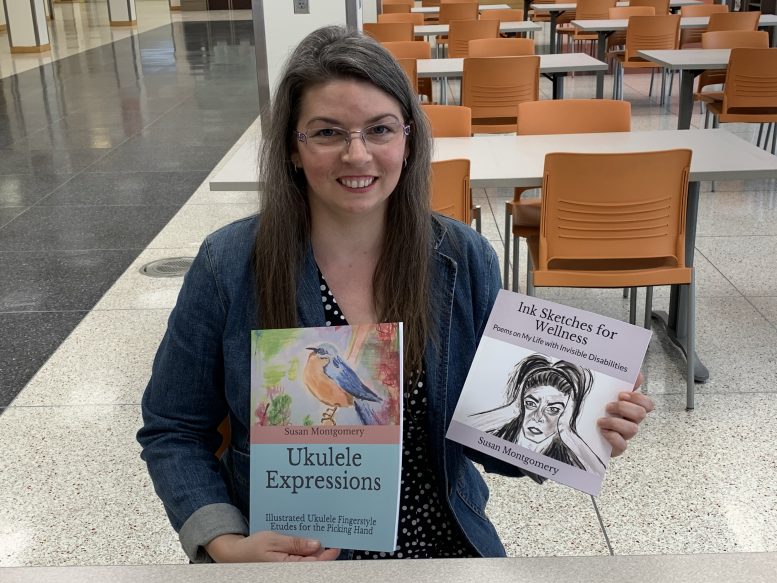BY ANDREW BAILEY
BG Independent News Correspondent
Pain inspired Susan Montgomery.
She’s used her anguish from a lifetime of medical issues to write two new books. “Ukulele Expressions: Illustrated Ukulele Fingerstyle Etudes for the Picking Hand” was released at the end of April, and “Ink Sketches for Wellness: Poems on My Life with Invisible Disabilities” was released in late May.
The books are all Montgomery’s work, even the publication process. She chose to self-publish
because it cost less, and she had more control over printing.
Self-publishing is a more time-consuming process than working with a publisher, Montgomery said. But she is no stranger to powering through tough situations to achieve her goals.
She was often sick during her time at BGSU in the late 2000s, she said. “It was always a mystery what was wrong with me.”
Since then, she has been diagnosed with fibromyalgia, which causes fatigue and muscle pain, ulcerative colitis, an autoimmune digestive disease, and superior canal dehiscence, which affects balance and sound sensitivity and causes her to hear her eyeballs moving in their sockets.
She graduated in 2011 with a Bachelor of Fine Arts in Art Education. She went on to teach in local schools, but eventually had to stop due to fatigue and pain during each workday.
“Pieces started falling into place,” she said. “Some conditions start causing other conditions, some medications cause other conditions. It’s just been a big snowball.”
Due to being immunocompromised, quarantine amplified preexisting anxiety and depression.
But she has a sense of humor about the suffering she has experienced. “It’s important to laugh about it, or else you’ll just dwell on it and let it consume you,” she said.
She was also diagnosed with carpal tunnel syndrome in both hands. She got and healed from surgery on her right hand in 2008, but the pain started to flare up again while learning the ukulele.
While awaiting surgery on her left hand, she decided to learn the ukulele and compose songs that can be played with just one hand.
Quarantine also allowed her to explore new opportunities, as “the pandemic inspired a ton of creativity.”
Work on “Ukulele Expressions” actually started with the guitar, she said. Her boyfriend got her one in July, but playing and singing on the guitar seemed a bit nerve-wracking to her, so she picked up the simpler ukulele to “have more fun with.”
She taught herself with Lisa McCormick’s virtual beginner courses, and after developing a friendship with her and joining Silver Linings, an online international ukulele group, McCormick wrote the foreword to Montgomery’s book of compositions and corresponding nature-themed ink paintings.
The songs are written in tab, so they can be learned easily, and use standard notation, so they can be played on more instruments than the just the ukulele. They incorporate standard and alternate tuning, along with a capo, which is a clip put on the neck of a string instrument to facilitate playing in different keys. Every song can be played with one hand as well.
“Ink Expressions” is a compilation of poems and sketches that express Montgomery’s struggles with her medical conditions.
She stressed the importance of sharing stories about mental health, so others can “not feel so
alone sometimes.”
She began work on this when she wrote the first poem, “Death to Noisy Eyeballs,” in 2013
about her superior canal dehiscence.
She’s been creating additional works for what became “Ink Expressions” ever since.
“It’s been a lot to deal with, socially, emotionally, physically, so I put all that frustration into these sketches and poems,” she said.
The poems and sketches range from humorous to sad, but Montgomery hopes readers can find relatability in them and “get a good laugh out of it.”
She especially hopes people with invisible disabilities like her can find their own therapy and inspiration through her books. Invisible disabilities are often overlooked or left unaccounted for because they are not immediately noticeable.

